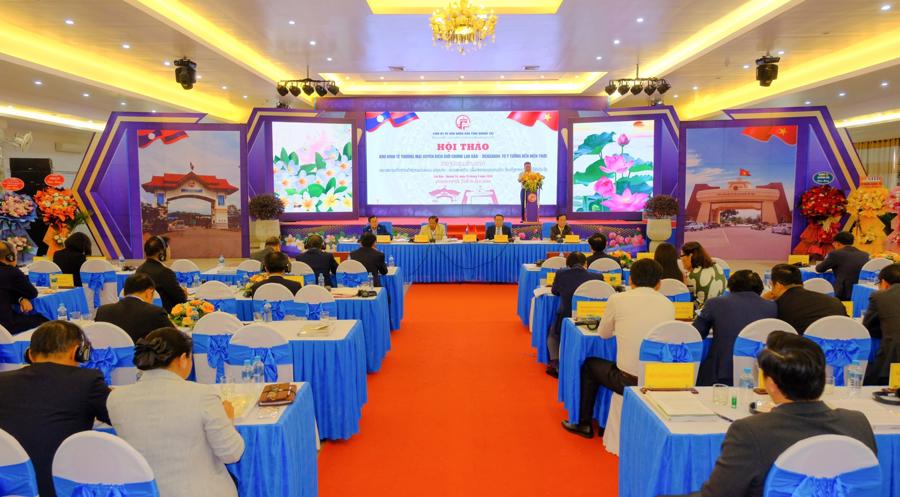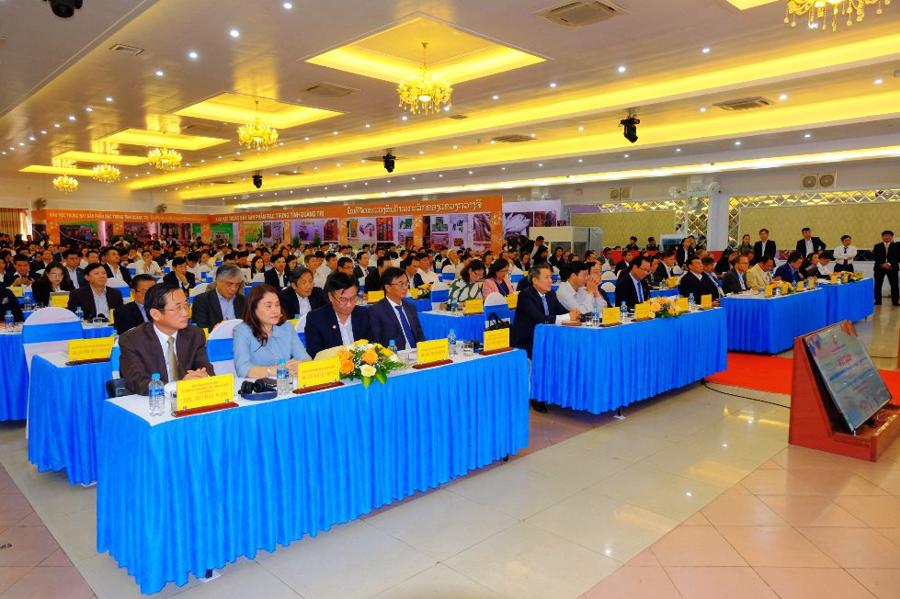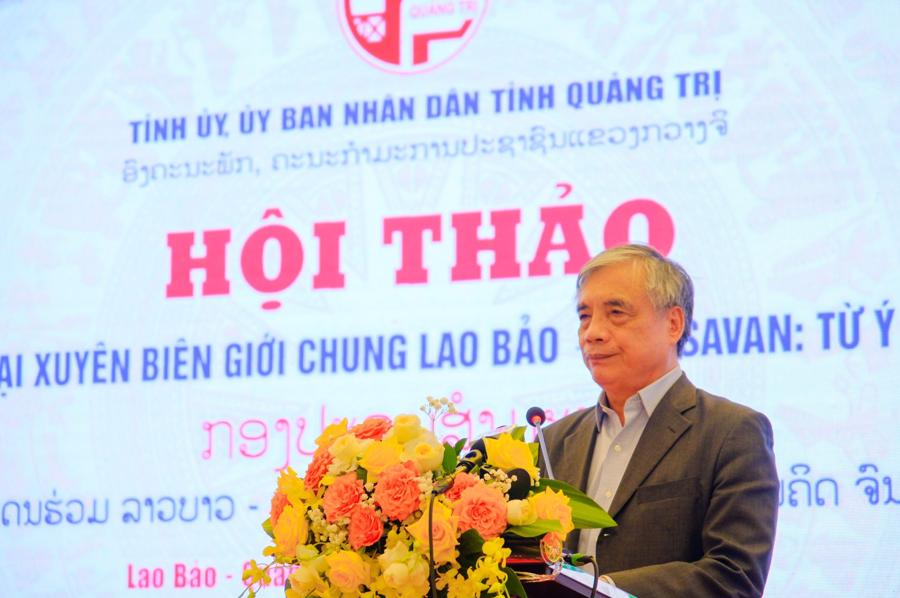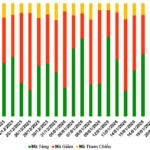A workshop on the “Lao Bao Cross-Border Economic and Trade Zone (Quang Tri Province, Vietnam) – Densavan (Savannakhet Province, Laos): From Idea to Reality” took place on the afternoon of March 15th in Lao Bao town, Huong Hoa district, Quang Tri province.
The workshop, organized by Quang Tri province and Laos’ Savannakhet province, attracted more than 200 delegates representing the ministries and central agencies of the two countries, as well as experts, researchers, and domestic and foreign enterprises.
The Lao Bao Special Economic and Trade Zone in Quang Tri province was established in 1998 under the name of the Lao Bao Economic and Trade Development Zone, with specific preferential policies aimed at promoting socio-economic development in the Vietnam-Laos border area.
Over the past 26 years, Quang Tri province has focused on investment and development, gradually transforming the border area into an urban area along the East-West Economic Corridor in Vietnam. However, the Lao Bao Special Economic and Trade Zone has not developed as expected, and there are still limitations and shortcomings in the policy mechanisms that need to be addressed to create new momentum for the border area.

The Lao Bao Special Economic and Trade Zone (Vietnam) and the Densavan Cross-Border Trade Zone (Laos) were established based on the advantages of the region and the guidelines of the Communist Party of Vietnam and the Lao People’s Revolutionary Party since 1997, with the goal of building the “Lao Bao-Densavan Free Trade Area”.
Resolution No.26, issued by the Central Committee of the Communist Party of Vietnam in 2022, concerning the socio-economic development and national defense and security of the North Central and Central Coastal regions until 2030, with a vision towards 2045, sets out the direction to “pilot the model of border economic zones along the East-West Economic Corridor”.
In the “Cooperation Plan between the Governments of Vietnam and Laos for 2023”, signed on January 12, 2023, the content of the pilot model for the border economic zone along the East-West Economic Corridor was included in the agreement between the two Prime Ministers. In accordance with the high-level leadership’s directions of the two countries, Quang Tri province has collaborated with Savannakhet province (Laos) to develop the pilot project “Building the Lao Bao-Densavan Cross-Border Economic and Trade Zone” to advise the central ministries, agencies, and governments of the two countries on implementing this important policy.

The workshop aimed to introduce the project, especially the unique and preferential policy mechanisms to be applied in the Lao Bao-Densavan Cross-Border Economic and Trade Zone, in order to gather opinions from experts, scientists, relevant agencies, and the business communities of Vietnam and Laos.
This is the basis for Quang Tri province and Savannakhet province to further refine the project and draft the agreement between the two governments, which will be submitted to the Ministry of Planning and Investment – the Standing Office of the Vietnam-Laos Cooperation Committee – and the relevant ministries and agencies of the two countries for implementation.
At the workshop, experts, researchers, and managers from both sides focused on clarifying the feasibility and proposing mechanisms and preferential policies to facilitate investment and business activities in the Lao Bao-Densavan Cross-Border Economic and Trade Zone.

The opinions expressed at the workshop focused on proposing solutions for mobilizing capital, investing in the infrastructure of the border gates of the two countries to develop logistics services, industrial parks, free trade zones, and non-tariff zones, attracting investment projects for production and business activities, as well as implementing pilot mechanisms and preferential policies in the Lao Bao-Densavan Cross-Border Economic and Trade Zone.
The establishment of the Lao Bao-Densavan Cross-Border Economic and Trade Zone is in line with the current requirements for the development of trade and services in both Vietnam and Laos; it is an inevitable trend given the many changes and developments in the regional and global contexts.
According to Associate Professor Dr. Tran Dinh Thien, former Director of the Vietnam Institute of Economics, to build the Lao Bao-Densavan Cross-Border Economic and Trade Zone as a fundamental and practical development model, it is necessary to aim for a regulatory system suitable for high-level free trade zones in the world.

Currently, some other localities in Vietnam are striving to build their own “pilot” development regulatory systems. Hai Phong and Da Nang are actively seeking models for their own high-level free trade zones in the future. The construction of these regulatory systems for economic development, which are superior in terms of mechanisms, “requesting” the application and testing of “specific mechanisms and policies” by various localities (Hanoi, Ho Chi Minh City, Thanh Hoa, Nghe An, Khanh Hoa, Thua Thien Hue) needs to be considered and applied in the construction and development of the Lao Bao-Densavan Cross-Border Economic and Trade Zone.
A comprehensive program must be developed to build and develop the Lao Bao-Densavan Cross-Border Economic and Trade Zone, including the development of centers and strategic priority coordinates such as airports, seaports, and Dong Ha city.
Ensuring the similarity in terms of standards, structure, and connectivity in terms of the mechanisms and infrastructure for “crossing the border” between the two parts of the economic zone. Regarding the operation mechanisms of the Lao Bao-Densavan Cross-Border Economic and Trade Zone, it is necessary to aim for a new model of “free trade zone” to define specific tasks.
In terms of mechanisms and support policies for businesses, Hoanh Son Group representatives proposed further research on the application of the “one-stop, one-stop” inspection model with new regulations to simplify customs procedures and inspections, controls of goods and means of transport to facilitate international trade activities, immigration, import-export, and information connectivity between functional departments at border gates.
The governments of Vietnam and Laos are requested to invest in and upgrade the road from Thoai town to Ban Dong, connecting National Road 15B with National Road 9 (Laos side), as this will be an extremely important and favorable transport route for transporting coal and other goods from the southern provinces of Laos to Vietnamese seaports. The Vietnamese government and Quang Tri province are interested in investing in the Cam Lo – Lao Bao expressway to meet the increasing demand for transportation of goods in the coming years.
At the workshop, the leaders of Quang Tri and Savannakhet provinces agreed to propose to the relevant ministries and agencies of the two countries to advise the governments of Vietnam and Laos to sign an agreement on the pilot construction of the Lao Bao-Densavan Cross-Border Economic and Trade Zone as a legal basis for Quang Tri province and Savannakhet province to develop coordination mechanisms in the management and operation of the Lao Bao-Densavan Cross-Border Economic and Trade Zone.
At the same time, they will continue to coordinate with the relevant ministries and agencies of the two countries to develop, promulgate, and advise the government to issue regulations and guidelines for implementation.
Businesses investing in the Lao Bao-Densavan Cross-Border Economic and Trade Zone expect their rights to be protected by the laws of the two countries based on the investment certificates issued during their operations (land-use duration, land lease duration). The pilot mechanisms and policies must stipulate a suitable minimum time frame to ensure that businesses can invest with confidence, and any policy changes should be in favor of the businesses that have already invested.















